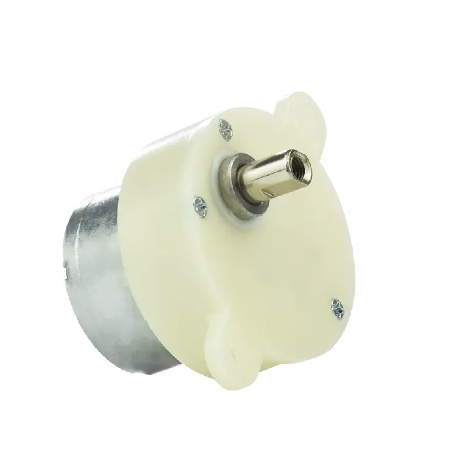Based on the material of the housing, geared motors are categorized into plastic and metal types. Our selection encompasses metal gears fabricated through power metallurgy and hardware processing. Each type possesses distinct advantages and limitations. Herein, we explore the merits of opting for plastic geared motors:
- Economical: The manufacturing cost of plastic gears is typically lower than that of metal gears, with savings ranging from 50% to 90% due to the absence of secondary finishing processes.
- Silent Operation: Plastic gear motors exhibit superior shock absorption, resulting in quieter operation.
- Design Flexibility: Plastic molding allows for more intricate and efficient gear geometries, including internal, cluster, and worm gears, which are cost-prohibitive to produce in metal.
- Precision Engineering: High precision is attainable with plastic gears through consistent material quality and stringent molding process controls.
- Load-bearing Capacity: Wider plastic gears can support greater loads and transmit more power per stage than their metal counterparts.
- Corrosion-resistant: Plastic gears do not corrode, making them suitable for environments where metal gears would degrade, such as water meters and chemical plant controls.
- Self-lubricating: Many plastics have inherent lubricity, suiting them for low-load applications like computer printers and toys, and they can also be enhanced with grease or oil.
- Lightweight: Plastic gears are often lighter than metal gears, offering advantages in certain applications.
- Shock Absorption: Plastic's capacity to deflect enhances its shock absorption over metal, better distributing loads from misalignment and manufacturing variances. Limitations include a lower modulus of elasticity, reduced mechanical strength, inferior heat dissipation, and a higher thermal expansion coefficient.
These factors, particularly temperature, rotational speed, and transmission torque, can limit the application of plastic gears in high-load and high-speed scenarios.

Drawbacks of Plastic Gears vs. Metal
▪ Lower elasticity and strength
▪ Poor heat conduction
▪ Higher thermal expansion
▪ Limited to low-load and low-speed use due to temperature sensitivity and wear
Plastic gears, while offering numerous advantages, also present certain limitations when juxtaposed with metal gears. These limitations include a lower modulus of elasticity, reduced mechanical strength, inferior heat conduction capabilities, and a more pronounced coefficient of thermal expansion. The primary factor influencing wear is temperature, with rotational speed and transmitted torque being pivotal in determining the temperature at the gear surface, which in turn affects wear. These characteristics can restrict the application of plastic gears in scenarios involving high loads and high rotational velocities.
Sinbad Motor's expertise in brushless motors, spanning over ten years, has led to a vast collection of custom prototypes. The company also supplies precision planetary gearboxes and encoders with specific reduction ratios for rapid, customer-specific micro transmission design.
Editor: Carina
Post time: Apr-29-2024

